This post may contain affiliate links meaning that, I may make commission if you purchase through my links. Learn More.
It’s time to take a step in exploring your true, authentic identity. These 150 journal prompts to get to know yourself will help guide you to deep self-discovery and truly uncover the answer to life’s biggest question: “Who Am I?”
Getting to know yourself is so valuable for self-discovery, self-respect, and living a fulfilled life of authenticity and happiness.
That said, deeply knowing who you are is oftentimes easier said than done.
When we really take the time to reflect on the big question “Who Am I?”, it can be easy to feel overwhelmed, unsure, and even a bit confused.
Yes, we live every day within our own minds and bodies. But that is not all it takes to truly know yourself.
True self-discovery requires quality introspection, self-reflection, exploration, and patience. Getting to know yourself is a lifelong process – Let’s start today.
These Who Am I journal prompts are here to help you get to know yourself better and promote your journey toward self-discovery, self-love, and authenticity.
Types of Who Am I? Journal Prompts
Getting to know yourself is about getting to know ALL parts of yourself. From goals and dreams to fears and anxieties to hobbies and relationships – there is a lot to learn about who you are.
These journal prompts to get to know yourself have been divided into a few main categories of self-discovery.
- Personal Identity – your core values, personality traits, and identity
- Life Experiences – the memories and moments that make up who you are
- Emotions and Feelings – your emotional patterns, unexpressed emotions, triggers, and emotional history
- Goals and Aspirations – your goals, dreams, and hopes for your future
- Love and Relationships – your friendships/connections, how you interact with people, and your role in a relationship
- Creativity and Passions – hobbies, passions, interests, and creative outlets that inspire you
With these categories, we can start to explore the question “Who Am I?” and establish a well-rounded sense of self.
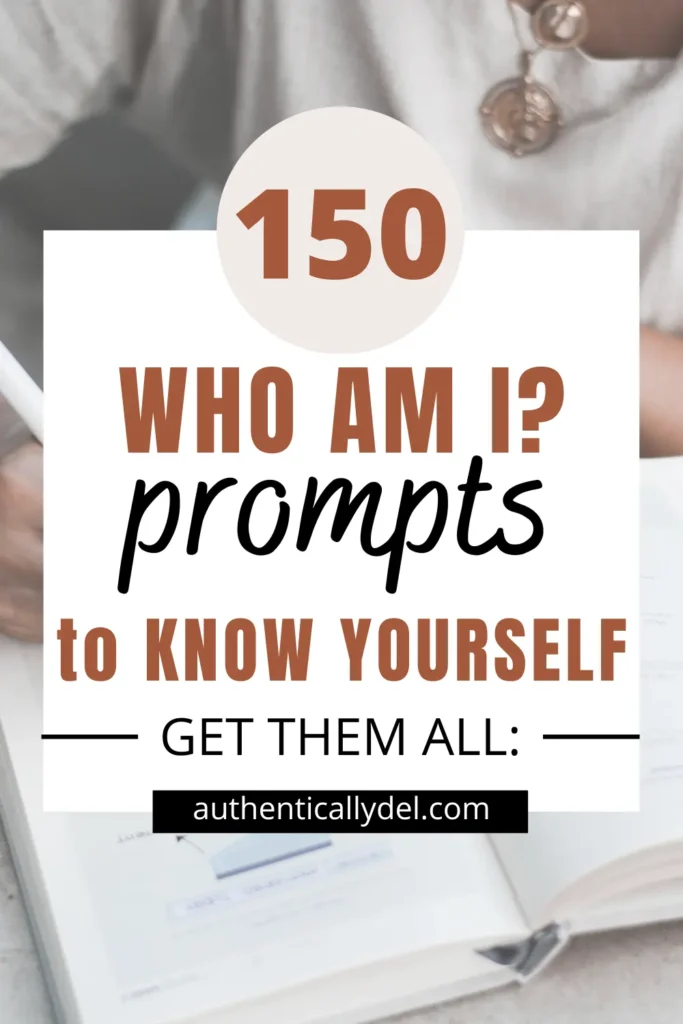
150 Journal Prompts for Getting to Know Yourself Better
Use these Who Am I? journal prompts for self-discovery, self-reflection, and getting to know yourself better.
Pick your favorite self-discovery journal prompts from the categories that resonate with you the most, pick up your favorite journal and a good pen, and let’s get to it!
Personal Identity Self-Discovery Prompts
Let’s explore your core values, personality traits, and identity.
- If you could describe yourself in three words, what would they be? Why?
- How do you feel others would describe you? Does this differ from how you would describe yourself? If so, why?
- What is your favorite non-physical quality about yourself? Why?
- What is your least favorite non-physical quality about yourself? Why?
- List your core values as a human. How do you live in alignment with these?
- Describe a time that you acted out of alignment with your core values. Why? How did that feel?
- What is your strongest personality trait?
- Do you consider yourself stubborn or docile?
- Would you say you are naturally relaxed or do you tend to be more anxious?
- Do you deal with any mental illness/mental health struggles? How does that impact you?
- Do you feel you possess addictive/obsessive qualities?
- Are you more of an introvert or an extrovert?
- How would you describe your personality as a child? How is it different from how you are now? In what ways is it the same?
- Are you impulsive or do you take time to make decisions carefully?
- What personality traits best serve you in your life?
- Are you more emotion-driven or logic-driven?
- Do you prefer quiet solitude or busyness? Why?
- What personality traits do you enjoy/admire in others?
- Make a list of all the things that you feel make up your identity.
- When do you feel the most YOU? What are you doing? How does it feel?
- Reflect on how your self-identity has evolved over the years. What significant life events or experiences have influenced this evolution?
- Describe your ideal self. What characteristics and qualities would your ideal self possess?
- What are your roles in different areas of your life (e.g., as a friend, family member, employee, student)? How do you define yourself in these roles?
- What do you feel makes up a person’s identity? (Roles? Traits? Career? Goals? Etc.)
- Make a list of all the things you love about yourself.
RELATED POST: 100 THINGS TO LOVE ABOUT YOURSELF
Reflecting on Past Life Experiences
Let’s reflect on the memories and moments that have made up who you are today.
- Reflect on your past achievements. How have they contributed to your self-identity and personal growth?
- Reflect on your past failures. How have they contributed to your self-identity and personal growth?
- Describe a pivotal moment in your life that changed your perspective on everything. How did it impact your choices and values?
- Reflect on your earliest childhood memory. What emotions and lessons can you draw from it?
- What was a challenging experience that pushed you to grow/made you stronger? What did you learn from it?
- Describe your relationships with your parents and/or caregivers growing up. How do you feel like that shaped who you became?
- What was your favorite way to spend time as a kid? How can you reconnect to that childlike playfulness and fun?
- If you could relive any day from your past, which day would it be, and why?
- Outside of your family, who had a major impact on you growing up? (Teachers, coaches, friend’s parents, etc.)
- What were your favorite school subjects growing up? Do you still love learning about those things?
- Write about a book, movie, or piece of art that touched you deeply. What themes or messages stuck with you?
- Reflect on your cultural, spiritual, or religious experiences. How have they shaped your beliefs and values?
- Describe a defining moment in your life. What makes it feel so significant?
- How do you feel your childhood friendships shaped who you have become?
- Are you still in contact with any childhood friends? If so, how have your relationships grown over time? In what ways is it the same?
- What is a memorable childhood family tradition that you will take/have taken with you into your own family?
- What year of school was your favorite? Why?
- Write about a moment where you changed your mind on something. Why? How?
- How would you describe your position in your family? What roles did you fulfill as a kid? What has changed and what remains the same?
- Describe your favorite childhood vacation. Who was there? Where were you? What moments stick out?
- What were your favorite TV shows and/or movies as a kid?
- Write about your favorite forms of play as a child. Indoor? Outdoor? Sports? Solo? Group?
- How did you imagine your life at this age as a kid? How is it different? In what ways is it the same?
- Write a letter to your child self. What would you tell him/her?
- Write a letter from your child self. What do you think you would say to/ask yourself now?
Emotions and Feelings
Let’s get curious about your emotional patterns, unexpressed emotions, triggers, and emotional history.
- What do you feel is your default emotion? With minimal external influences, where do you reside emotionally?
- Do you feel that you control your emotions or do your emotions control you? Explain.
- In what ways do your emotions enhance or improve the quality of your life? Describe a time this happened.
- In what ways do your emotions hinder or take away from the quality of your life? Describe a time this happened.
- How do you handle anger?
- What do you do when you feel sad?
- Create a pie chart of your top 5 emotions, dividing them by how often you feel them.
- How much do you let your emotions dictate your actions? Do you think this is a positive or negative thing?
- Would you consider yourself a highly emotional person? Explain.
- Do you feel that you are an empath? How do you know? (Learn more about what an empath is here.)
- Do you have a favorite emotion? If so, why?
- Describe, in detail, a time you felt overwhelming joy.
- When was the last time you felt true curiosity, awe, or wonder?
- Describe a time you felt intense fear or anxiety. How do you cope with this?
READ: 50 CALMING ANXIETY JOURNAL PROMPTS | 100 AFFIRMATIONS FOR EASING ANXIETY
- Describe a time you felt immense gratitude. How did this feel?
- What is your relationship with stress? How does stress impact your life?
- What/who brings up a strong feeling of love, adoration, or affection in you? Why?
- How do you express love?
- What is your love language? How do you best receive love?
- Are you comfortable with vulnerability? Why or why not?
- Do you feel that you embrace and hold space for your emotions or are you uncomfortable with deep emotions?
- How did you see anger handled in your home as a kid? How has that shaped your relationship with it?
- Write about your relationship with nostalgia. How does it feel to you? Is it a positive or negative sensation?
- How do you deal with shame, guilt, or embarrassment? Describe a time.
- Describe your experience with compassion. How does it show up in your life? Are you more compassionate to yourself or to others?
Goals and Aspirations
Self-reflection means looking forward too! Let’s talk about your goals, dreams, and hopes for your future.
- When was the last time you felt a sense of anticipation or excitement for the future? What possibilities and opportunities were you looking forward to?
- Write down 3-10 short-term goal ideas for the next year. Why do each of these matter to you?
- Write down 10-20 long-term goal ideas for your future. Why do each of these matter to you?
- In what ways would you like your life to improve?
- What areas of life do you feel need the most help/focus? How can you best improve them?
- Describe your career aspirations. What do you want from your professional life in the short- and long-term?
- What are your goals for your future family life? Describe how you want your family to look.
- When was the last time you felt truly accomplished after achieving a goal? What specifically made you successful?
- What is a childhood dream you still hold on to? Why is it important to you?
- How have your goals changed/shifted over the last 1-5 years?
- Describe a day in your dream life 1 year from now. 5 years? 10 years?
- What mental health goals do you have for yourself? How do you want to improve your mindset or mental health?
- What is a major obstacle you have overcome in your life? How did that strengthen you?
- What are your financial goals? Do your current financial habits align with that? Why or why not?
- What relationship goals do you have? Do you want a partner? Marriage? A good relationship with self? Etc.
- What social or friendship goals do you have? How can you work on strengthening social connections?
- What are your goals for personal growth or self-development? Why?
- What positive habits do you currently possess? What negative habits would you like to break?
- Describe your educational goals. What would you like to learn more about?
- What boundaries are necessary to set to help you achieve your goals (with yourself or others)? How do you feel about setting these boundaries?
- How can you appreciate your life now while also striving for more? How do you find that balance?
- What are your goals for your home? Do you have specific home-related dreams?
- Describe your goals for personal happiness and fulfillment. How can you prioritize your well-being and contentment in your daily life?
- Describe your relationship with self-trust and/or self-doubt. How does that impact your goals?
- What is a goal you have been hesitating to pursue? Why? What is holding you back?
Love and Relationships
Relationships are a big part of who you are. Let’s explore some self-discovery prompts related to your friendships and connections, how you interact with people, and your role in a relationship.
- How have relationships in your life positively shaped who you are today? Give examples.
- How have relationships in your life had a negative impact on you? If any, give examples.
- What is the biggest lesson you’ve learned from relationships in the past year? 5 years?
- Examine your closest friendships. What are the qualities that make these friendships valuable?
- Do you feel like all relationships should be 50/50? Are there exceptions? Explain.
- How do you tend to express love and appreciation for the people close to you?
- Does physical intimacy or emotional intimacy make you feel more connected to your romantic partners?
- What makes a connection special to you? What sets it apart from others?
- Describe your ideal romantic partner. What traits do they possess?
- Describe your ideal friendship. What traits do they possess?
- Reflect on a time that you set a boundary that was supportive. What helped here? How did you set effective boundaries?
- How could your relationships benefit from firmer boundaries? In what ways would you like to see the dynamic shift?
- How do you want to FEEL when with a romantic partner? What helps you feel that way?
- Describe an experience of forgiveness. What lessons did you take from that?
- Describe your role in relationships/communities. How do you feel about this?
- Write about a time that you felt isolated or disconnected from others. How did this impact you?
- What is your view on digital or social-media-based connections? Do you have any positive or negative views on it?
- Reflect on a time you helped mend or heal a fractured relationship. What did you learn or take away from this?
- What do you feel is your biggest area for improvement in relationships? How can you work on that?
- What do you feel is your greatest strength in relationships? How does this play a role in your relationships?
- What does a healthy relationship mean to you?
- What does family mean to you? Do you consider anyone that you are not related to family? Why?
- How do you define the difference between solitude and loneliness?
- What helps you feel safe in a relationship/friendship? What do you need in order to feel vulnerable and open?
- Make a gratitude list of all the amazing people in your life (past or present). Write down 1-3 reasons they are important to you.
Fun, Creativity, and Passions
Everyone needs a little fun in their lives! Let’s explore your hobbies, passions, interests, and creative outlets that inspire you.
- Do you have any hobbies currently? Describe them.
- When is the last time you remember feeling “in a flow state“? What were you doing?
- What is your favorite form of art to create? (Painting, drawing, writing, dancing, etc.) How does it make you feel?
- What is your favorite form of art to consume? How does it make you feel?
- When you were a kid, what were your favorite pastimes? When was the last time you tried any of these activities?
- If you had no responsibilities for a week, how would you fill your time?
- What is a hobby/activity you’ve been curious to try? How can you start nurturing that curiosity?
- Describe the feeling of creativity. How does it sit in your body? In your mind?
- What is your current (or most recent) creative project/idea you have had? Write about what made it special to you.
- What are you passionate about? Is there a specific cause/message/community you feel drawn to?
- What is the role of creativity in life? Do you think it is meaningful and worthy of being prioritized? Why or why not?
- Do you prefer to share your creative work with others or keep it for yourself? Why?
- Reflect on a time that you shared your work with others. How did this feel? Was it a positive or negative experience for you?
- When have you been pushed out of your comfort zone creatively? How did this help you grow?
- Do you feel there is creativity in your professional life/career? Are you happy with it this way? Why or why not?
- Reflect on a time that you discovered a new creative passion or interest. How did this feel?
- How much space do you think should be made for creativity in your life? Is it an extra or an essential to you?
- Do you think work and creativity should be separate or combined? Why?
- Think about the potential of your creative work. How might it change the lives of others?
- Write about a time that someone’s creative work has deeply impacted you in a positive way. Describe this.
- What does “play” mean to you? How do you know when you are “playing”?
- What is a piece of art that sticks with you? (poetry, song lyrics, books, paintings, photographs, etc.) How has this touched you?
- What interests do you have that you would like to explore or learn more about?
- Who is a creative role model for you? Why do you look up to them?
- How might creativity, hobbies, and passions further enhance your life and who you are?
How to Journal to Know Yourself Better
When journaling for self-discovery, it can feel easy to get overwhelmed. These are big questions and it can be daunting to know where and how to begin.
No need to stress. This process, even if it is new to you, can be gratifying and effective without any pressure.
Here are some tips, tricks, and tactics for these Who Am I? journaling prompts.
Be Honest and Vulnerable
You are journaling to get to know yourself better – and that is going to require some truth-telling.
In order to effectively journal for self-discovery, you need to accept the discomfort that may come with increased honesty, vulnerability, and transparency.
Here’s the good news.
These Who Am I? journal prompts are just for you. There is no pressure to share these with anybody else.
That relieves any pressure to be performative or search for the “right” answer. You are free to be 100% authentically you.
READ: 50 EVERYDAY HABITS THAT WILL IMPROVE YOUR MENTAL HEALTH
Let Go of Judgment
With increased honesty, authenticity, and vulnerability may come some increased internalized judgments.
As you explore these self-discovery journal prompts, you may find yourself facing feelings of shame, judgment, or discomfort about your truth.
This is a really natural part of the “Who Am I?” process – and we can work to actively negate this negative self-talk.
Let go of unhelpful conditioning, expectations placed on you (by yourself or by others), judgments, resentment, guilt, or shame.
Instead, approach these Who Am I? journal prompts with curiosity, wonder, self-compassion, and grace.
Easier said than done, of course. However, building a strong relationship with yourself requires a judgment-free space to be fully authentic.
Build a Journaling Habit
Like anything new, when first starting journaling you may face a period where it feels tedious, undesirable, or you simply forget. That’s okay! It’s still fresh!
Building up a journaling habit is one of the most essential parts of effective journaling.
By consciously making journaling a priority in your daily life, you start to build a really great habit that will serve you well in your self-discovery and personal growth journey.
READ: 100 SIMPLE DAILY HABITS TO IMPROVE YOUR LIFE
This takes time.
To start, schedule a set time every day that you are intentional about sitting down and journaling – even on the days you are feeling uninspired!
Over time, you will build the journaling habit and you won’t even have to think twice about it.
Journaling is a valuable habit to have, but it doesn’t build itself. It takes time, commitment, and consistency.
Trust the process as you introduce it into your everyday routine!
Try Different Journaling Techniques
Part of the beauty of journaling is how personalized it can be.
If you are not feeling connected to one form of journaling, there are so many different techniques and formats for journaling that you can explore.
Some Journaling Formats/Techniques to Consider:
- freewriting (paragraph style)
- prompted/guided
- list making
- doodling/drawing
- stream of consciousness journaling
- structured journaling (such as a 5-minute journal)
- artistic journaling
- brain dumping (written thoughts in any format)
- vocal journaling (voice-to-text or recorded voice memo)
Be sure to give any technique a true, fair shot before deciding it’s not for you. However, if you are truly not connecting with one form of journaling, try out another!
Ultimately journaling is meant to add to and enhance your life, not feel like another chore on your to-do list. Find a journaling process that works for you!
Best Self-Discovery Journals
Here are some of my favorite journals and resources for taking on these Who Am I? journaling prompts.
Erin Condren Notebooks↗
Erin Condren has tons of beautiful, customizable, and functional notebook design options.
Self-Discovery Art Journal ↗
This art-based journal has guided self-discovery journal prompts for drawing, doodling, and writing!
One-Year Guided Journal ↗
This guided self-discovery journal takes you through 52 weeks of getting to know yourself better.
10 Key Benefits of Journaling
As we know by now, self-discovery journaling can help you answer the big life question: “Who Am I?”, but what else is journaling good for?
Journaling has many profound and meaningful benefits that are worth noting when considering building a consistent journaling routine.
Let’s explore some of the biggest benefits of journaling.
1. Self-Reflection
Journaling promotes introspection and self-reflection that allows you to better know and connect with yourself.
By providing a safe and private opportunity to explore honest thoughts, emotions, memories, worries and experiences, journaling allows you the ability to practice full authenticity and self-understanding.
2. Stress Reduction
By having a secure place to express your thoughts, feelings, worries, and concerns, journaling can help reduce stress and anxiety in your daily life. After writing out your thoughts, you can feel freer, lighter, and more clear-headed than before.
3. Increased Self-Awareness
Activitely writing your thoughts, feelings, and behaviors in a journal can help you recognize your own patterns and habits – for better or for worse.
Self-awareness is improved when you take the time to deeply express, reflect, and critically think about your own actions, thought patterns, and behaviors. Journaling provides a platform for that.
4. Problem Solving
Journaling on conflicts or challenges can help you actively work through them in a helpful and productive way.
Mental clarity comes when you express your dilemmas in writing. This can help you view your situation in a new way and explore solutions that you may not have considered before.
5. Goal Setting
Journaling can be a tool for goal-setting and tracking. Studies have found that you are 42% more likely to achieve a goal if you write it down.
Journaling is a tool that can help you brainstorm, plan, take action on, track, and achieve your biggest goals and dreams for your life.
6. Time Management and Organization
Keeping a journal can help you improve your time management, productivity, and organization skills.
If you use your journal to plan, prioritize, schedule, and track, you can greatly improve your time management abilities.
7. Emotional Regulation
Journaling helps you become better connected to your emotions. Writing about your emotions can help you understand them better, identify them, and work your way through them.
Additionally, journaling can help you better articulate, communicate, and respond to your feelings which, in turn, benefits you and your relationships.
8. Heightened Creativity
Journaling promotes creative thoughts. Even on days where you don’t feel like you have much to write, taking time to journal can stimulate creative thoughts and expression.
Journals are a breeding ground for new ideas, fresh insights, renewed inspiration, and rejuvenated creativity.
9. Improved Communication
Journaling is a practice in communication skills.
Regular writing in a journal makes you more comfortable with self-expression and helps you understand how to communicate clearly, effectively, healthily, and articulately.
10. Documentation of Life
Nothing better than looking back through an old journal and reflecting on your entries!
Journaling acts as a record log of your lived experiences and emotions. It allows you to reflect back on moments, recognize personal growth, and celebrate achievements over time.
A Note on Journaling to Get to Know Yourself
When answering these Who Am I journal prompts, remember to keep an open mind.
Approach with curiosity and wonder rather than expectations and judgments.
Answering “Who Am I?” is a huge, lifelong feat. Who we are is ever-evolving and shifting. This is a good thing.
As we progress through life, we learn, grow, and adapt.
Defining who you are can include elements that are both solid and consistent (core values, etc.) while also changing and developing (opinions, beliefs, etc.).
You can be a whole, wonderful human while also being a growing work-in-progress. We all are!
I hope these Who Am I journal prompts can help you get to know yourself better in this process.
More Journal Prompts to Get to Know Yourself
75 SELF-LOVE JOURNAL PROMPTS FOR CONFIDENCE
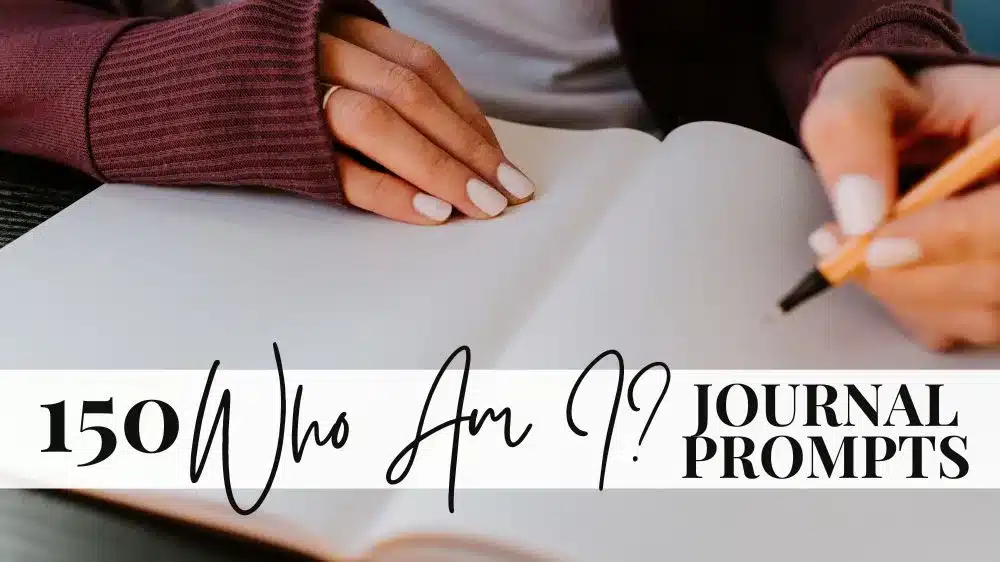
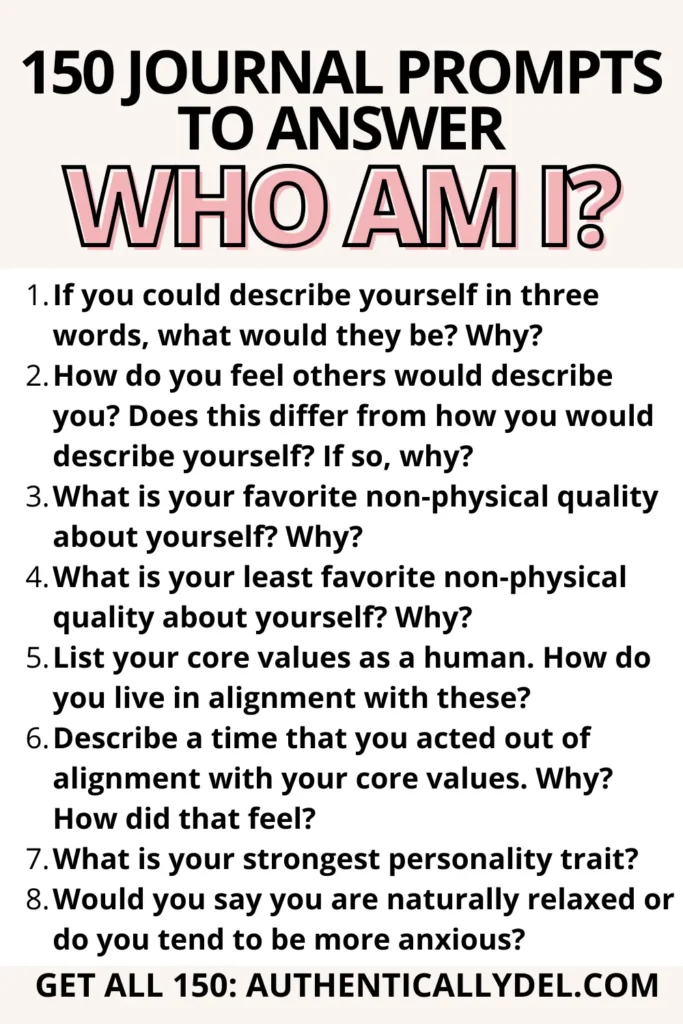
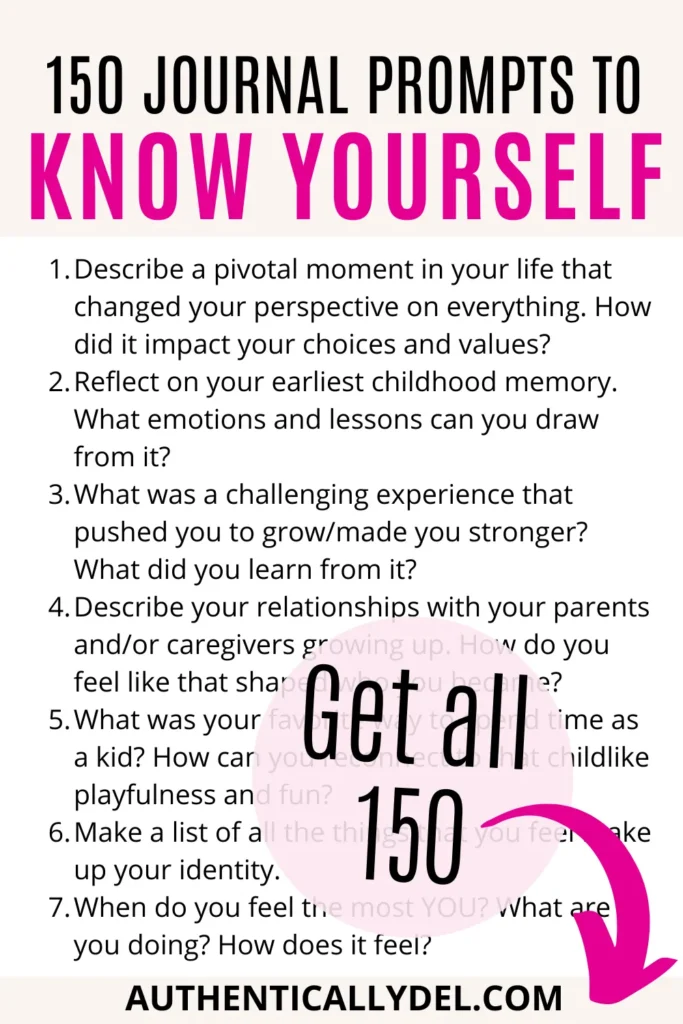
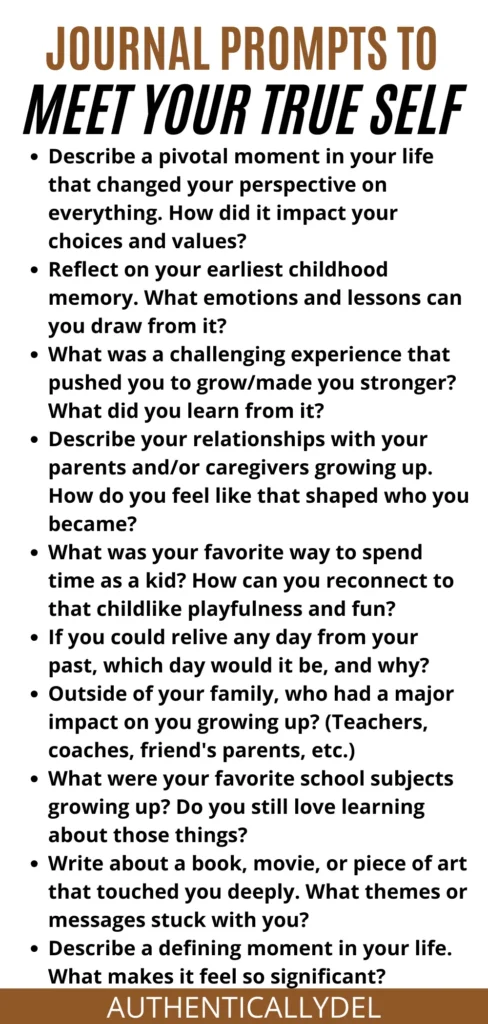

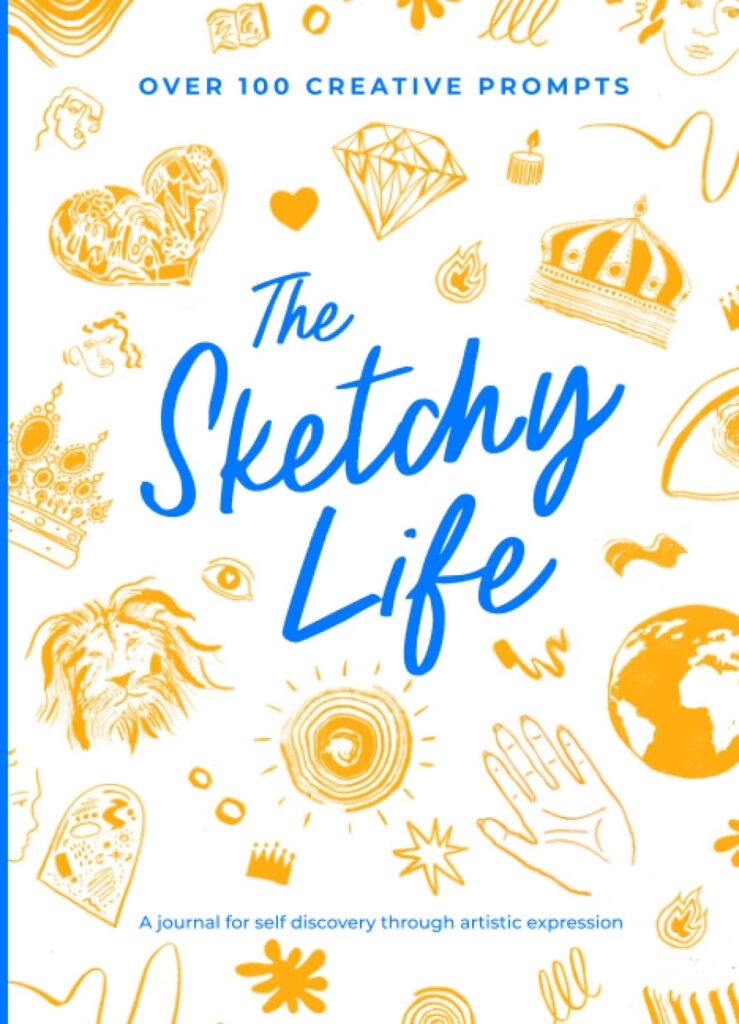
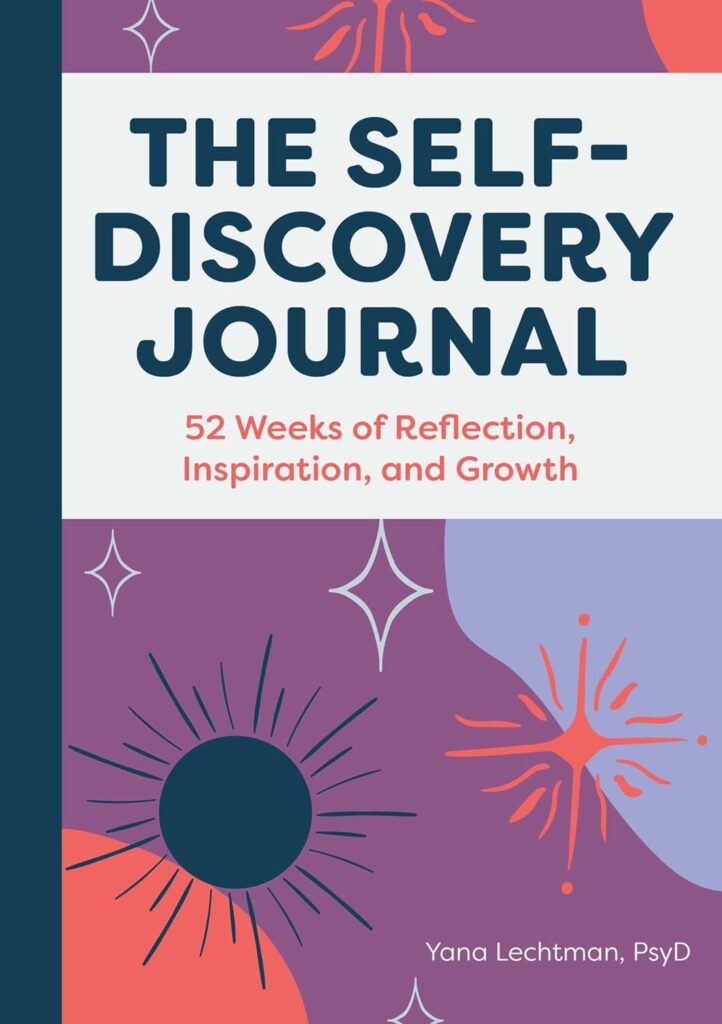
Leave a Reply